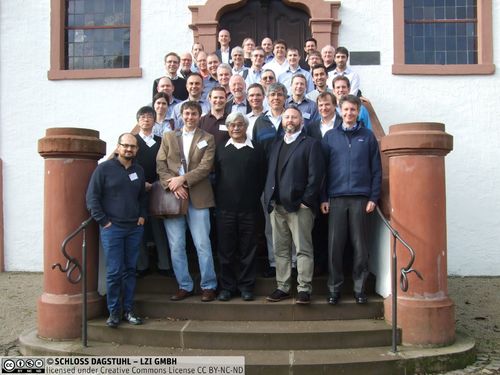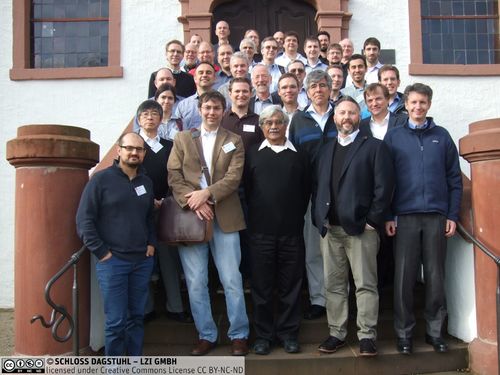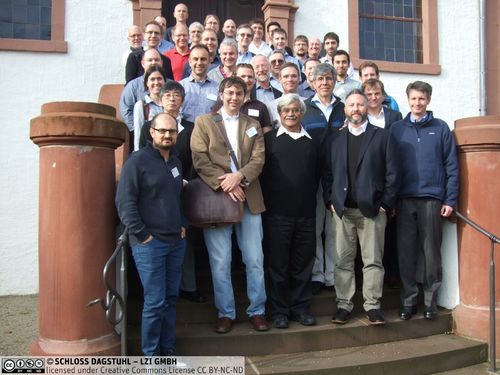Dagstuhl Seminar 15462
The Mobile Revolution – Machine Intelligence for Autonomous Vehicles
( Nov 10 – Nov 13, 2015 )
Permalink
Organizers
- Wolfram Burgard (Universität Freiburg, DE)
- Uwe Franke (Daimler AG - Sindelfingen, DE)
- Mohan Trivedi (University of California, San Diego - La Jolla, US)
Coordinator
- Markus Enzweiler (Daimler AG - Böblingen, DE)
Contact
- Annette Beyer (for administrative matters)
Schedule
Machine intelligence, robotics and computer vision are with us today and have a familiar embodiment --- the modern vehicle. The dream of autonomous vehicles in particular has a surprisingly long history with first prototypical implementations going back to the early 1980s. What started then as a vision of pioneers is actually happening right now --- we are on the verge of a mobile revolution with self-driving vehicles at the core. The tremendous progress made in the last years has been sparked by the increased methodical and technical availability of better sensors, sophisticated algorithms, faster computers and more data.
But, we are not quite there yet. Autonomous systems make extreme demands on system performance, quality, availability, reliability and verification that significantly increase with the rising degree of automation. Such diverse requirements give rise to numerous problems and open questions that are currently addressed in substantial academic and industrial research activities in many fields of computer science and engineering. The time has come to bring together the leading experts from both academia and industry to discuss the state-of-the-art, identify further research directions and refine the overall vision of intelligent autonomous vehicles into a consistent and practicable picture.
The ultimate design goal for autonomous systems is to mimic human behavior in terms of understanding and seamlessly acting within a dynamic human-inhabited environment. Although artificial sensors emulating the human sensory systems are nowadays widely available, current autonomous systems are still far behind humans in terms of understanding and acting in real-world environments. The chief reason is the (theoretical and practical) unavailability of methods to reliably perform perception, recognition, understanding and action on a broad scale, i.e. not limited to isolated problems. In this sense, this seminar aims to stimulate research and discussions on the following topics:
- Intelligent Robotics: Scene understanding, situation awareness, (inter-)acting in human environments
- Digital Maps: Self-localization, map generation, map content, interrelation of map and sensory information
- Human-centered Intelligent Vehicles: Driver monitoring, situation awareness outside and inside the vehicle
- Verification and Validation: How can reliability, availability, maintainability, trustworthiness and safety of autonomous intelligent vehicles be determined and ensured?
- Limitations and Perspectives: What is needed to deploy autonomous vehicles on a large scale? This seminar aims to define the state-of-the-art, identify the current problems and issues, and provide a consistent vision on the topic of intelligent autonomous vehicles. It will serve as a communication platform between the various sub-communities involved, by bringing together key persons in industry and academia in their respective fields. Additionally, relations between different disciplines of intelligent transportation systems can be identified and exploited. The seminar allows its participants to bridge the gap between fundamental research and real-world applications by identifying further research directions and initiating interdisciplinary collaborations in the field of multi-sensory environment perception for autonomous cars.
The seminar will take place in parallel to a related seminar entitled "Vision for Autonomous Vehicles and Probes", led by Andres Bruhn, Atsushi Imiya, Ales Leonardis and Tomas Pajdla (November 08-13, 2015) which focuses on machine vision for different kinds of autonomous systems. Given the collective interest of both seminar groups in topics such as map-building, self-localization and the state-of-the-art in autonomous vehicles today, the necessary arrangements will be made to allow joint sessions and discussions between all attendees of both seminars.
- Die mobile Revolution – Maschinenintelligenz für autonome Fahrzeuge
Press release in German
Motivation and Perspective
Machine intelligence, robotics and computer vision, formerly rather peripheral disciplines of computer science, are in fact already with us today and have a familiar embodiment – the modern vehicle. Systems that are currently available strongly couple interdisciplinary fundamental research with complex practical realizations. The vision of autonomous vehicles in particular has a surprisingly long history with first prototypical implementations going back to the early 1980s. What started then as a dream of pioneers such as Ernst Dickmanns is actually happening right now – we are on the verge of a mobile revolution with self-driving vehicles as its central foundation. The tremendous progress made in the last years has been sparked by the increased methodical and technically availability of better sensors, sophisticated algorithms, faster computers and more data.
But, we are not quite there yet. Autonomous systems make extreme demands on system performance, quality, availability, reliability and verification that significantly increase with the rising degree of automation. Such diverse requirements give rise to numerous problems and open questions that are currently addressed in substantial academic and industrial research activities in many fields of computer science and engineering. Extraordinarily positive innovation effects result from the knowledge transfer between industry and academia, as successfully demonstrated by initiatives such as Uni-DAS or DRIVE-U. The increasing relevance and interest in the computer science community, particularly in the fields of robotics, computer vision and machine learning is evident through an abundance of papers and workshops at major computer science conferences.
This seminar has brought together the leading experts from both academia and industry to discuss the state-of-the-art, identify further research directions and refine the overall vision of intelligent autonomous vehicles into a consistent and practicable picture.
Seminar Topics and Structure
The ultimate design goal for autonomous systems is to mimic human behavior in terms of understanding and effortlessly acting within a dynamic human-inhabited environment. Although artificial sensors emulating the human sensory systems are nowadays widely available, current autonomous systems are still far behind humans in terms of understanding and acting in real-world environments. The chief reason is the (theoretical and practical) unavailability of methods to reliably perform perception, recognition, understanding and action on a broad scale, i.e. not limited to isolated problems.
Following the classical perception-action cycle, the central topics of the seminar have evolved around four key questions posed from the perspective of an autonomous vehicle:
- Intelligent Robotics
- Digital Maps
- Human-centered Intelligent Vehicles
- Verification and Validation
- Limitations and Perspectives
The seminar was held in a very interactive workshop style allowing for ample time for thorough discussions. There were four main sessions with talks and discussions, c.f. the seminar schedule in Section 4, focusing on autonomous driving projects, mapping and localization, sensing, as well as evaluation and approval. The first session on state-of-the-art autonomous driving projects has been co-organized with Seminar 15461 as a joint session.
 Markus Enzweiler
Markus Enzweiler
- Michael Aeberhard (BMW AG - München, DE) [dblp]
- Jan Becker (BOSCH Research Center - Palo Alto, US) [dblp]
- Klaus Bengler (TU München, DE) [dblp]
- Claus Brenner (Leibniz Universität Hannover, DE) [dblp]
- Wolfram Burgard (Universität Freiburg, DE) [dblp]
- Erik Coelingh (Volvo Car Corporation - Göteborg, SE) [dblp]
- Michael Darms (Volkswagen AG - Wolfsburg, DE) [dblp]
- Markus Enzweiler (Daimler AG - Böblingen, DE) [dblp]
- Ryan Eustice (University of Michigan - Ann Arbor, US) [dblp]
- Uwe Franke (Daimler AG - Sindelfingen, DE) [dblp]
- Dariu M. Gavrila (Daimler R&D - Ulm, DE) [dblp]
- Alex Goldberg (HERE - Carlsbad, US)
- Ralf G. Herrtwich (Daimler AG - Böblingen, DE) [dblp]
- Ulrich Hofmann (Audi AG - Ingolstadt, DE) [dblp]
- Michael James (Toyota Research Institute North America- Ann Arbor, US) [dblp]
- Serge Lambermont (Delphi Labs - Mountain View, US)
- Antonio M. López Pena (Autonomus University of Barcelona, ES) [dblp]
- Chris Mansley (BOSCH Research Center - Palo Alto, US)
- Markus Maurer (TU Braunschweig, DE) [dblp]
- Karsten Mühlmann (Robert Bosch GmbH - Heilbronn, DE) [dblp]
- Urs Muller (NVIDIA Corp. - Morganville, US) [dblp]
- Michel Parent (INRIA - Le Chesnay, FR) [dblp]
- Mikael Persson (Linköping University, SE) [dblp]
- Raul Rojas (FU Berlin, DE) [dblp]
- Torsten Sattler (ETH Zürich, CH) [dblp]
- Steven E. Shladover (University of California at Berkeley, US) [dblp]
- Christoph Stiller (KIT - Karlsruher Institut für Technologie, DE) [dblp]
- Matthias Strauß (Continental Teves AG - Frankfurt, DE)
- Mohan Trivedi (University of California, San Diego - La Jolla, US) [dblp]
- Sadayuki Tsugawa (AIST - Ibaraki, JP) [dblp]
- D. Scott Williamson (HERE - Chicago, US)
- Hermann Winner (TU Darmstadt, DE) [dblp]
- Hans-Joachim Wünsche (Universität der Bundeswehr - München, DE) [dblp]
Classification
- artificial intelligence / robotics
- computer graphics / computer vision
Keywords
- Autonomous Driving
- Machine Intelligence
- Robotics
- Environment Perception
- Situation Awareness
- Digital Maps
- Traffic Safety




 Creative Commons BY 3.0 Unported license
Creative Commons BY 3.0 Unported license
